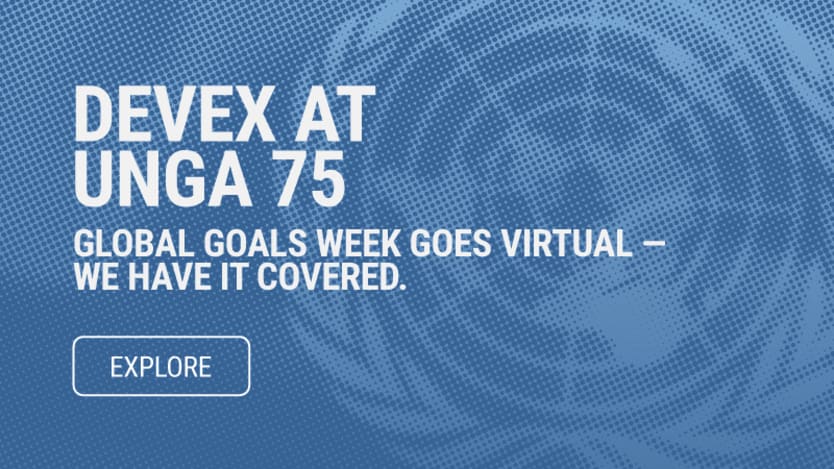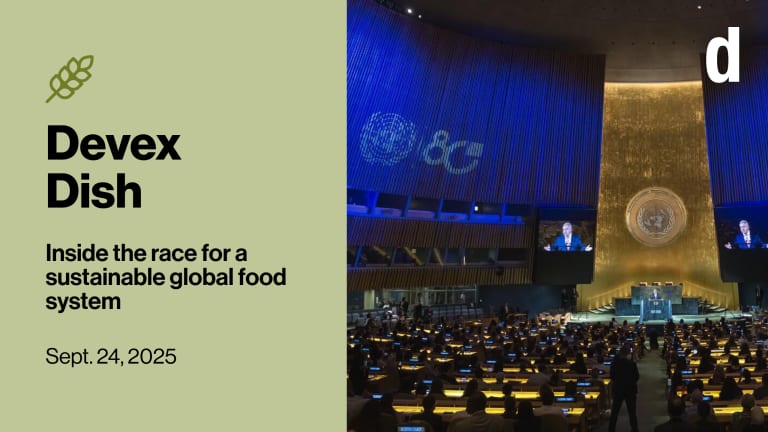NEW YORK — The pandemic’s ripple effects on humanitarian emergencies and backsliding development trends are going to worsen over the next few years as crises burn “fiercer than ever,” United Nations Emergency Relief Coordinator Mark Lowcock warned ahead of the U.N. General Assembly opening session this week.
Focus on: People and the Planet
This series explores how climate change and other planetary imbalances impact the rising trend of human inequality. We look into the potential solutions to eliminate inequality and support a healthy planet.
The risk of famines and the spread of extremist groups are both increasing, Lowcock told Devex Editor-in-Chief Raj Kumar in a recent interview. Humanitarian crises that are now deteriorating as a result of the COVID-19 pandemic threaten to “engulf lots of people and places beyond where they are starting,” Lowcock explained.
“I would also say you ain’t seen nothing yet, because it is building up and there is a time lag,” Lowcock said. “So, now is the time to open our eyes, understand what is happening, and take the action to preempt the worst.”
“If you think 2020 is hard, I would say buckle up now for what is around the corner.”
— Mark Lowcock, emergency relief coordinator, U.N.“We can legitimately say we were surprised by the virus. We won’t next year, or the year after, be able to say that we were surprised by the consequences of the virus. It is obvious to everybody what is happening and the risks that lie ahead,” Lowcock continued.
This past year started with warning signs of a global humanitarian situation that “looked very difficult,” according to Lowcock. The crises required a level of international response that quickly became “really quite stretched,” he told Devex in late 2019.
Now, in many of the world’s poorest countries, COVID-19 cases continue to grow, though exact case numbers are likely an underestimate in humanitarian settings, Lowcock explained.
“The raw data on coronavirus cases in humanitarian settings is not really to be trusted, because there is very little testing, and there is a huge preponderance of cases not being captured in the raw data,” Lowcock said.
But even in nations that have been spared the worst of the pandemic, its varied consequences, including widespread loss of employment, is impeding humanitarian and development gains. Food insecurity, child poverty, early childhood death, and maternal mortality rates are all again on the rise following a decade of unsteady, but in many cases forward-moving, progress.
How is COVID-19 affecting progress on the SDGs? Will online meetings mean greater international representation? Our reporters are covering the all-virtual 75th United Nations General Assembly to find out.
“COVID has compounded many, many other problems,” Lowcock said. “Famines are back. We have to do something to nip these problems in the bud. We see a significant deterioration in health services in many fragile countries. So, we need to recognize it is a somber moment, but a moment in which the United Nations is more important than ever.”
In 2017, Yemen, northern Nigeria, Somalia, and South Sudan were at risk of their food insecurity situations developing into famines. That potential has now resurged and expanded, according to Lowcock. All four countries face the potential of a famine, and other nations including Burkina Faso, the Democratic Republic of the Congo, Afghanistan, and Zimbabwe have worrying trends of food insecurity, according to Lowcock.
Increased donor aid funding prevented a famine three years ago in Yemen, where 40% of the population is expected to face high levels of food insecurity by the end of this year, according to the U.N. Children’s Fund. But several major donors that have been involved in the conflict in Yemen — including Saudi Arabia, the United Arab Emirates, and Kuwait — have not contributed to the U.N.’s $2.41 billion humanitarian response plan in Yemen, Lowcock told the U.N. Security Council this week.
Overall, as of Sept. 10, the U.N. has brought in about 25% of the $10.34 billion it seeks for its global COVID-19 humanitarian response work.
Geopolitical tensions during the pandemic have contributed to the “difficulty in getting policy makers to come together, find collaborative, cooperative solutions,” to humanitarian crises, Lowcock explained. He described the U.N.’s humanitarian response plan as “pocket change,” compared to the $11 trillion governments have spent to address the pandemic in their own countries.
“I think it is right they are spending $11 trillion to pump liquidity and fiscal support into the economy and protect their own citizens. The argument I make is, ‘You would also be smart to spend 1% of that money protecting yourself and acting generously to deal with back problems that can come to you from other places,’” Lowcock said.
Lowcock explained that extremist groups and some authoritarian regimes are using the pandemic to pursue “their own agendas.”
“Sixty-six million people are controlled by some armed group, not a sovereign government, and in some cases an extreme, violent group. That is not the phenomenon we used to be dealing with. During the course of 2020, we have seen violent extremists gain more sway in places like Mali, parts of the Sahel, even parts of Mozambique,” Lowcock said. “This is a growing problem. A lot of that is to do with the response to various grievances people have.”
A recovery in the global economy will likely directly benefit humanitarian crises more than the emergence of a COVID-19 vaccine, Lowcock said.
“Until we see more resources flowing into the most fragile countries, it is unrealistic to expect that things are going to improve very much. I fear we could face a situation that is deteriorating for a year or more. Now is not the time to avert your gaze. We need eyes wide open on this. And if you think 2020 is hard, I would say buckle up now for what is around the corner,” Lowcock said.









